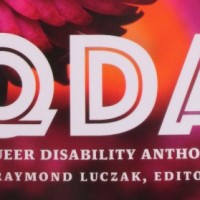‘QDA: A Queer Disability Anthology’ Edited by Raymond Luczak

Author: Sandra Lambert
October 21, 2015
Rabble rousers, “small d” deaf and gay, large “D” deaf multimedia artists, Black non-binary essayists, radical faeries, medievalists, queer femmes, queer women, queer poets, genderqueer poets, genderfluid poets, and trans poets, social workers, civil engineers, ordained ministers, ex-Pentecostals, and atheists, the hard of hearing, East Asian queer and autistic activists, cartoonists, painters, producers of disability theatre, librarians, and artists living with bipolar disorder—these are some of the forty-eight contributors that Raymond Luczak has brought together into an anthology of fiction, poetry, nonfiction, and comics.
I’ve often said that we people with disabilities write all sorts of things in all sorts of ways, but the one thing we mostly have in common is that we never leave the body out of the writing. I’ve also found that close attention to the physical adds strength and focus to writing. QDA is an anthology that offers wild and affirming examples of this. James Schwartz’s poems “Scene” and “Bent” are just eight and six lines long respectively, yet one is sharply erotic and the other drops you deep into intimacy. And this is accomplished through pinpoint physical scenes—”A crooked arm/Has enough strength/To grasp onto/His arching back.” Liv Mammone’s poem “Vagina Resigning” says “My vagina has put in/for a transfer from my legs/’irreconcilable differences,’ she says.” And Gregory Villa’s unsentimental (I’m a sucker for the unsentimental) essay “Limp” about “a less than perfectly functioning dick” has clarity and momentum and makes you laugh and punches you in the gut a time or two. Lucas Scheelk’s poem “A Prayer for a Non-Religious Autistic” thrilled me with the way it manifests a mental process in poetic terms. Here’s a poem that builds itself on the both the repetition that heals the poet and repetition as a poetic technique. Perfect.
The contributors range from disability scholars who write essays strengthened by their clear analysis of society to new writers who tell their story simply in a “that happened and then this happened” style. Both are effective. Both are important. Some pieces are tough. Toranse Lowell’s essay “Learning the Words” is about silence and religion and abuse. “When I was 20, I wanted to die, when I was 16, I wanted to die, when I was 12, I wanted to die, when I was four, I wanted to die.” Some pieces are transcendent. D. Allen writes about imagined surrogate hands that are “castles of salt and foam/They will always hold you.” Jax Jacki Brown’s poem “Unrequited Love (from my wheelchair to a shopping trolley)” is wonderfully silly. Some I feel in my own body—Barbara Ruth’s line “pain and desire/battle it out,” Arthur Durkee’s “I am a monk in my own home, ill long enough to lose track of what others say really matters,” D. Allen writing “Often I confuse pain with a poverty/of love,” and here’s a line from Ashley Volion’s poem. “Don’t touch me unless you want to fuck/My new mantra/And I don’t mean it the gentle way.”
Like I said, we write in all sorts of ways. My least favorite of these ways (and I’ve done this myself) is when it’s obvious that we’re writing directly to an able-bodied audience. But I have to take it back to allow for Liv Mammone’s essay “Advice to the Able-Bodied Poet Entering a Disability Poetics Workshop.” The poet says, in perhaps my favorite quote from the anthology, “I’m not your metaphor. Phantom limbs, deafness, or blindness as figurative language in your poems will result in unhinging my fucking jaw.”
QDA: A Queer Disability Anthology
Edited by Raymond Luczak
Squares and Rebels
Paperback, 9781941960028, 356 pp.
November 2015

